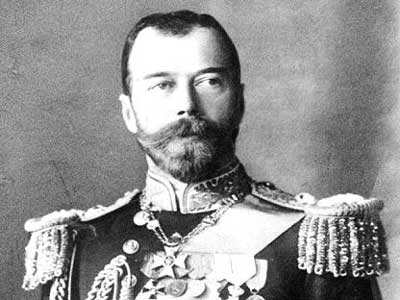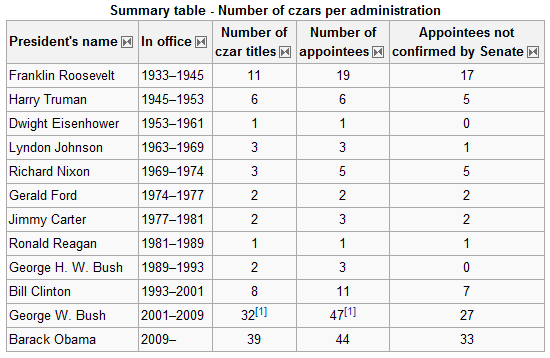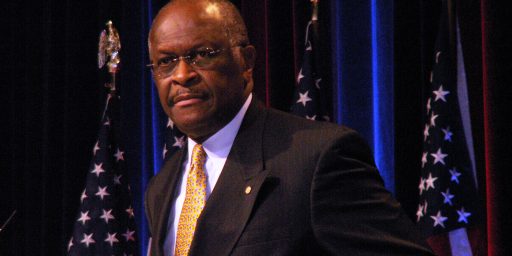Republicans Want to Ban Czars
House Republicans want to do away with the increasing number of "czars" in the White House.
House Republicans want to do away with the increasing number of “czars” in the White House.
A group of House Republicans introduced a bill on Wednesday to rein in the various “czars” in the Obama administration.
Rep. Steve Scalise (R-La.) and 28 other House Republicans introduced legislation to do away with the informal, paid advisers President Obama has employed over the past two years.
The legislation, which was introduced in the last Congress but was not allowed to advance under Democratic control, would do away with the 39 czars Obama has employed during his administration.
The bill defines a czar as “a head of any task force, council, policy office within the Executive Office of the President, or similar office established by or at the direction of the President” who is appointed to a position that would otherwise require Senate confirmation.
Republicans had complained about the president’s use of czars to help advance his agenda in Congress. In particular, the GOP had harped about the personal history of Van Jones, the president’s czar for “green jobs,” over past comments Jones had made about Fox News came to light. Jones eventually resigned.
Another prominent czar over the past year was Carol Browner, the president’s energy and environmental adviser. She helped head up efforts in response to the Gulf of Mexico oil spill, and the ultimately unsuccessful effort for an energy and climate bill from Congress.
Now, this is exceedingly unlikely to go anywhere, since Democrats still control the Senate. Even if it somehow passed both Houses of Congress, Obama would surely veto this slap at his prerogatives. And there’s no way the Republicans muster the two-thirds votes in both Houses necessary to override.
As an empty gesture, though, this isn’t bad. I happen to agree that these “czars” are extra-constitutional and just generally a bad idea. And I can’t think of a single problem that’s ever been solved by one of these people.
Still, it should be noted, Obama didn’t exactly invent the practice. Here’s a list from Wikipedia, which looks to be close enough to accurate for our purposes (it’s preceded with the disclaimer “The list is subjective and imprecise, since frequently individuals or offices might be referred to by the nickname “czar” by some publication or a political opponent, yet the actual governmental official, a majority of publications and others do not use the term.”):
Until looking it up, I was under the mis-impression that Ronald Reagan had invented the concept when he appointed Bill Bennett drug czar. That’s wrong on three counts: the czar concept began with FDR, the drug czar position was created by Richard Nixon, and Bennett didn’t become drug czar until the GHW Bush administration (he was Reagan’s NEH chair and Education Secretary).
Regardless, it’s arguable that a difference in degree becomes a difference in kind. We had 11 tsars at the height of WWII and the Great Depression and had only one or two at a time until the Clinton administration. But the real explosion came under George W. Bush, who took it from 8 to 32 — nearly triple FDR’s! Obama’s escalation has been comparatively small.
My favorite of the positions is held by John Goss. In addition to being Director of the Office of Economic Opportunity, he’s also the “Asian Carp czar.” No one seems to be responsible for other varieties of carp or, indeed, other fish species.








If there is an Asian carp czar this shows how this could be boring and useful at the same time.
If I remember cable tv, Asian carp are invading mid-west rivers, which form the borders of states, and would be managed by a confusion of state and federal agencies. If not a czar what then, a committee?
I happen to agree that these “czars” are extra-constitutional and just generally a bad idea.”
The Constitution says the president shall take care that the laws shall be faithfully executed, but, you know, it doesn’t say exactly what this taking care shall consist in. I’d think that any attempt by the Congress to place limits on the president’s ability to take such care, etc, wouldn’t go down to well in the courts, supposing such an attempt would survive a veto. (I’m passing on whether czars are a good idea or not).
“As an empty gesture, though, this isn’t bad.”
This taken in conjunction with the Constitutional reading in the House, I have to wonder, what are House Republicans going to do when they run out of empty gestures? It’s almost as if they think voters put them in office to engage in “feel good” symbolic rituals that buck up the base but accomplish little else.
Empty gesture?
Who the hell do you think is paying their salaries?
Not every taxpayer may agree with you, Herb.
I say keep making “empty gestures” as long as the budget is cut!
@JP: Presumably, this would be under the purview of some actual official of government? The EPA director?
@Sam: I’m not sure the “take care” clause is the right place to look but it also occurred to me that there might be separation of powers issues here. Presidents have wide berth in staffing the EOP. The question is whether the powers of the czars are such that they require confirmation. But many czars are already Senate confirmees in their official jobs.
@Herb: Symbolism isn’t necessarily bad, if it’s followed by substance. And there’s some utility in forcing votes on issues you care about.
The federal EPA director could try to create leadership over the federal Fish and Game, and the state EPAs and the state Fish and Games and the … who is in charge of water management? water traffic?
Starts to look pretty sketchy, doesn’t it?
As far as I’m concerned, the conservatives just have a bee in their bonnet about “czars” in a way that they don’t about “task forces” or “interdepartmental committees.” It is a silly distinction. Coordination is required as government grows, and knowing that they fight one particular kind of coordination … hoping I guess to get at the growth indirectly, by the long road.
Of course it could just be that hating on czars is a political game that works for them, and they don’t care what’s under it at all.
This is idiotic from both the legislative and executive branches. The “Czars” are nobodies other than super-white house staffers. All of their authority derives from their close, personal relationship with the President. When they speak, it is as if the President is speaking. When they direct, their directions are those of the President. Tell them to bugger off and the President is the person who has to step in.
The real problem with Van Jones was not he was a “czar” with marxist beliefs. It was this close, personal, empowered, direct representative of the President, who had Presidential authority to act without direct supervision of the White House had marxist beliefs.
Want to get rid of the czars, then the House should limit the Presidential staff budget to some total amount in salary without meddling in how it is allocated among the President’s chosen staff.
Or, start to hold those with the actual authority, the Department Secretaries and Agency Heads responsible for the actions taken. If they end up between a czar and a Congressional committee, the problem will need to be properly solved by the executive branch since they are the one with the President’s super-staffer problem. By law, the Cabinet and Independent Agencies answer to Congress in regards to mission and budget allocation. Who cares about some super-staffer the President has directed to oversee some policy?
Seems like they’re just kitchen cabinet members. If anything, the extra-constitutional action may well be any attempt to prohibit the president from having advisors.
> but it also occurred to me that there might be separation of powers issues here.
Might be?
@anjin-san:
I think the “would otherwise require Senate confirmation” clause makes it safe. If the appointment of a czar is an end around the confirmation process, the legislation is proper. If it’s merely a staffer with coordination responsibility and no power over budgeting and whatnot, then it’s crossing a line.